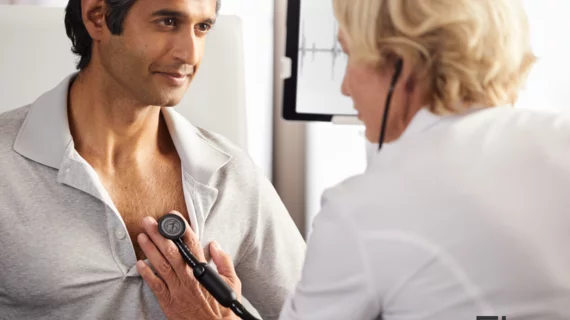Eko has received clearance from the U.S. Food and Drug Administration (FDA) for an advanced artificial intelligence (AI) algorithm designed to improve the identification and diagnosis heart murmurs in adult and pediatric patients.
The Eko Murmur Analysis Software (EMAS) works with the company’s trademark smart stethoscopes, allowing doctors to detect valvular heart disease (VHD) during routine visits using machine learning technology. According to data presented to the FDA, the EMAS algorithm is associated with an overall sensitivity of 85.6% and specificity of 84.4%. When treating adult patients, meanwhile, its sensitivity for identifying structural murmurs has a sensitivity of 90.2% and specificity of 90.6%.
“Combining pathologic murmur detection with the stethoscope, a tool already deeply embedded in the practice of medicine, will allow for more accurate and efficient screening of heart valve disease in the community,” Patrick M. McCarthy, MD, executive director of the Bluhm Cardiovascular Institute at Northwestern Medicine, said in a prepared statement. “Eko's platform will help uncover early VHD in millions of people worldwide who may otherwise be missed, and make a significant impact on our ability to treat patients with life-saving interventions.”
“This latest FDA clearance is another way in which Eko is improving access to better heart health through clinically-validated algorithms and best-in-class medical devices,” Connor Landgraf, Eko’s co-founder and CEO, said in the same statement. “By making heart disease screening algorithms and digital stethoscopes accessible in exam rooms around the country, we are moving towards a future in which more objective and consistent valvular heart disease screening can become the standard of care.”
The concept of smart stethoscopes has gained significant momentum in recent years, giving new life to a tool that has been guiding patient care throughout the world for more than 200 years. Eko previously gained FDA clearance for a suite of AI algorithms capable of detecting VHD and atrial fibrillation back in 2000. According to the company, this latest approval makes its smart stethoscopes the first on the market designed to differentiate between “innocent” and structural heart murmurs.
Related Cardiac Artificial Intelligence Content:
ScImage latest vendor to adopt DiA Imaging Analysis AI for echocardiography
Regulatory Roundup: FDA clears 2 new devices, grants breakthrough designation to advanced AI model
VIDEO: Getting cardiologist buy-in on artificial intelligence

